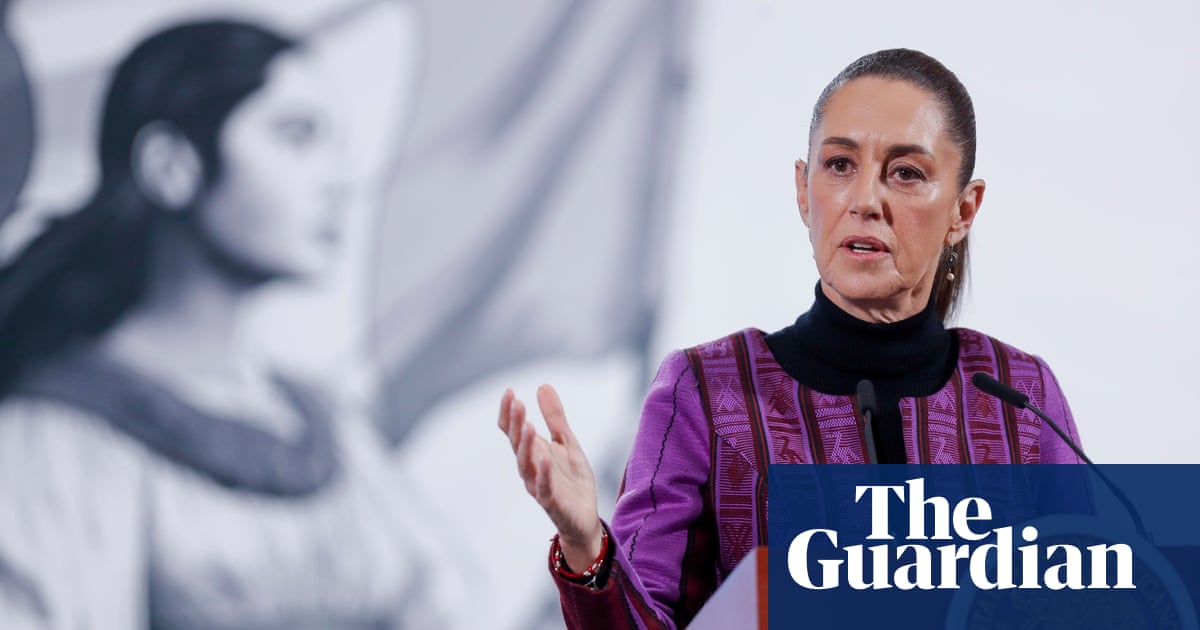As Donald Trump swings his sights from one region to the next, upturning diplomatic relations and confounding allies, leaders of former US partners have clashed with him and come off much the worse.
But so far, one – Mexico’s Claudia Sheinbaum – has emerged relatively unscathed.
With the US-Mexico border and the trade, drugs and migrants that cross it a focus of the Trump administration, Mexico is under intense pressure. Yet while Sheinbaum has made some concessions, she has also charmed Trump and won plaudits at home, with approval ratings that touch 80%.
“Sheinbaum has kept a cool head, and the capacity to hold firm and react to Trump,” said Carlos Pérez-Ricart, a political scientist. “But Mexico is in a situation of emergency with the US. And it will have to play this game for four years straight.”
Sheinbaum led Morena, a leftwing populist party, to a landslide victory in June last year, and had barely taken power when Trump won reelection in November.
Many wondered how Sheinbaum, a climate scientist before she became a politician, would handle the US president. But the two have struck up a relationship, with Trump describing Sheinbaum as a “marvellous woman” even as he claims Mexico is “essentially run by cartels”.
Since Trump announced a plan to hit all goods imported from Mexico with a 25% tariff, citing its alleged failure to stop migrants and fentanyl entering the US, Sheinbaum has offered to negotiate, while avoiding gestures of obeisance – like Canadian prime minister Justin Trudeau’s trip to Mar-a-Lago – or defiance –like Colombian president Gustavo Petro’s tirade against Trump on X.
Sheinbaum has also shown a willingness to do more on fentanyl, with Mexican security forces notching a record seizure just days after Trump’s announcement, and underlined that Mexico was already doing a great deal to keep migrants away from the US-Mexico border.

At the same time, she picked battles that allowed her to show strength to a domestic audience while avoiding direct confrontation with Trump himself – for example, threatening Google with a lawsuit after it bowed to Trump and renamed international waters in the Gulf of Mexico as the Gulf of America on Google Maps.
She has pledged to expand legal action against US gun manufacturers who produce the majority of weapons used in Mexico, and implicitly turned Trump’s rhetoric on its head by warning that her country would not tolerate an “invasion” of its national sovereignty by US forces.
“Sheinbaum found the sweet spot between the submission of Trudeau and the bravado of Petro,” said Pérez-Ricart.
The first real crunch came earlier this month, as the deadline for Trump’s tariff threat loomed.
Sheinbaum was poised to announce retaliatory measures when last-minute talks defused the situation, with Trump agreeing to delay the tariffs for a month in exchange for Mexico sending 10,000 more soldiers to the border.
It is unclear how those extra soldiers will reduce the flow of fentanyl, a substance so potent that only relatively small volumes are moved, and the great majority of which is trafficked through ports of entry by US citizens.
“What I see is a show for the Mexican and American publics,” said Martha Bárcena, a former Mexican ambassador to the US. “It’s clear that Trump is talking to his base and Sheinbaum to hers. But we don’t know what is happening in the conversations between them.”
“The president bought time – but the negotiation is not over,” Bárcena added.
The next deadline, on 4 March, for Trump’s tariffs will likely bring another round of feverish talks, as Mexico tries to convince the US of results made on fentanyl and migration.
“But if we don’t know what they want or how they want to measure it, then Trump can keep threatening us from here to the end of his government,” said Bárcena.
The US has also ratcheted up the pressure by adding six Mexican organised crime groups – including the Jalisco New Generation and Sinaloa cartels, two of the world’s biggest drug trafficking organisations – to its list of foreign terrorist organisations (FTOs).
While the designation of cartels as FTOs itself does not authorise US military action in Mexico, some fear it is a first step towards it.
Defense secretary Pete Hegseth recently said “all options will be on the table“ when it comes to dealing with the cartels. “Ultimately, we will hold nothing back to secure the American people,” he added.
Meanwhile, Mexico’s economy edges towards recession. The mere threat of tariffs has already helped dragged growth projections down, with Mexico’s central bank predicting 0.6% GDP growth for 2025.
That makes staving off tariffs and holding the US-Mexico-Canada free trade agreement together only more important for Sheinbaum.
“For 30 years, Mexico anchored itself to a policy of trade and development in North America. It bet its growth, its identity, on integration into North America,” said Pérez-Ricart. “And now this idea is being challenged. Trump doesn’t believe in it. This is a very delicate situation for Sheinbaum, and for the country.”

 German (DE)
German (DE)  English (US)
English (US)  Spanish (ES)
Spanish (ES)  French (FR)
French (FR)  Hindi (IN)
Hindi (IN)  Italian (IT)
Italian (IT)  Russian (RU)
Russian (RU)  19 hours ago
19 hours ago
























Comments